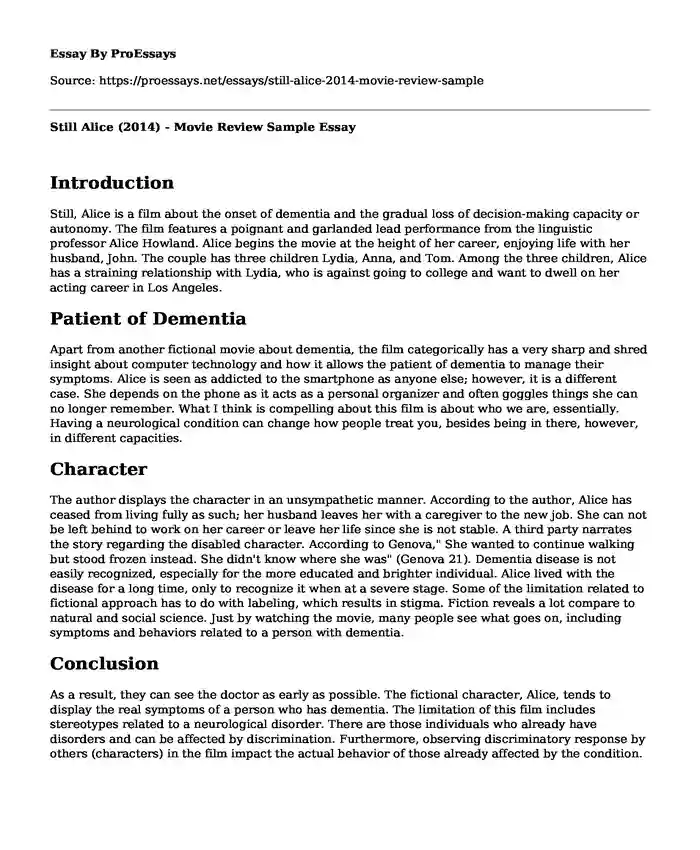Introduction
Still, Alice is a film about the onset of dementia and the gradual loss of decision-making capacity or autonomy. The film features a poignant and garlanded lead performance from the linguistic professor Alice Howland. Alice begins the movie at the height of her career, enjoying life with her husband, John. The couple has three children Lydia, Anna, and Tom. Among the three children, Alice has a straining relationship with Lydia, who is against going to college and want to dwell on her acting career in Los Angeles.
Patient of Dementia
Apart from another fictional movie about dementia, the film categorically has a very sharp and shred insight about computer technology and how it allows the patient of dementia to manage their symptoms. Alice is seen as addicted to the smartphone as anyone else; however, it is a different case. She depends on the phone as it acts as a personal organizer and often goggles things she can no longer remember. What I think is compelling about this film is about who we are, essentially. Having a neurological condition can change how people treat you, besides being in there, however, in different capacities.
Character
The author displays the character in an unsympathetic manner. According to the author, Alice has ceased from living fully as such; her husband leaves her with a caregiver to the new job. She can not be left behind to work on her career or leave her life since she is not stable. A third party narrates the story regarding the disabled character. According to Genova," She wanted to continue walking but stood frozen instead. She didn't know where she was" (Genova 21). Dementia disease is not easily recognized, especially for the more educated and brighter individual. Alice lived with the disease for a long time, only to recognize it when at a severe stage. Some of the limitation related to fictional approach has to do with labeling, which results in stigma. Fiction reveals a lot compare to natural and social science. Just by watching the movie, many people see what goes on, including symptoms and behaviors related to a person with dementia.
Conclusion
As a result, they can see the doctor as early as possible. The fictional character, Alice, tends to display the real symptoms of a person who has dementia. The limitation of this film includes stereotypes related to a neurological disorder. There are those individuals who already have disorders and can be affected by discrimination. Furthermore, observing discriminatory response by others (characters) in the film impact the actual behavior of those already affected by the condition.
Cite this page
Still Alice (2014) - Movie Review Sample. (2024, Jan 01). Retrieved from https://proessays.net/essays/still-alice-2014-movie-review-sample
If you are the original author of this essay and no longer wish to have it published on the ProEssays website, please click below to request its removal:
- Annotated Bibliography: How Social Media Affects Self-Esteem?
- How Alternative Forms of Drugs Can Be Considered a Viable Alternative to Conventional Medicine?
- Yoguslav the Black Wave Essay Example
- Rhetorical Analysis Essay: Is It Necessary to Have Health Insurance
- A Comprehensive Summary of My Dietary Intake: Tracking Progress Paper Example
- Paper Example on GERD: Symptoms, Causes, and Treatment
- Paper Sample on HL Suffers GI Tract Infection: Symptoms, Treatment, Rationale







